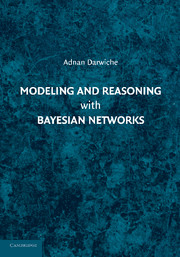Book contents
- Frontmatter
- Contents
- Preface
- 1 Introduction
- 2 Propositional Logic
- 3 Probability Calculus
- 4 Bayesian Networks
- 5 Building Bayesian Networks
- 6 Inference by Variable Elimination
- 7 Inference by Factor Elimination
- 8 Inference by Conditioning
- 9 Models for Graph Decomposition
- 10 Most Likely Instantiations
- 11 The Complexity of Probabilistic Inference
- 12 Compiling Bayesian Networks
- 13 Inference with Local Structure
- 14 Approximate Inference by Belief Propagation
- 15 Approximate Inference by Stochastic Sampling
- 16 Sensitivity Analysis
- 17 Learning: The Maximum Likelihood Approach
- 18 Learning: The Bayesian Approach
- A Notation
- B Concepts from Information Theory
- C Fixed Point Iterative Methods
- D Constrained Optimization
- Bibliography
- Index
1 - Introduction
Published online by Cambridge University Press: 23 February 2011
- Frontmatter
- Contents
- Preface
- 1 Introduction
- 2 Propositional Logic
- 3 Probability Calculus
- 4 Bayesian Networks
- 5 Building Bayesian Networks
- 6 Inference by Variable Elimination
- 7 Inference by Factor Elimination
- 8 Inference by Conditioning
- 9 Models for Graph Decomposition
- 10 Most Likely Instantiations
- 11 The Complexity of Probabilistic Inference
- 12 Compiling Bayesian Networks
- 13 Inference with Local Structure
- 14 Approximate Inference by Belief Propagation
- 15 Approximate Inference by Stochastic Sampling
- 16 Sensitivity Analysis
- 17 Learning: The Maximum Likelihood Approach
- 18 Learning: The Bayesian Approach
- A Notation
- B Concepts from Information Theory
- C Fixed Point Iterative Methods
- D Constrained Optimization
- Bibliography
- Index
Summary
Automated reasoning has been receiving much interest from a number of fields, including philosophy, cognitive science, and computer science. In this chapter, we consider the particular interest of computer science in automated reasoning over the last few decades, and then focus our attention on probabilistic reasoning using Bayesian networks, which is the main subject of this book.
Automated reasoning
The interest in automated reasoning within computer science dates back to the very early days of artificial intelligence (AI), when much work had been initiated for developing computer programs for solving problems that require a high degree of intelligence. Indeed, an influential proposal for building automated reasoning systems was extended by John McCarthy shortly after the term “artificial intelligence” was coined [McCarthy, 1959]. This proposal, sketched in Figure 1.1, calls for a system with two components: a knowledge base, which encodes what we know about the world, and a reasoner (inference engine), which acts on the knowledge base to answer queries of interest. For example, the knowledge base may encode what we know about the theory of sets in mathematics, and the reasoner may be used to prove various theorems about this domain.
McCarthy's proposal was actually more specific than what is suggested by Figure 1.1, as he called for expressing the knowledge base using statements in a suitable logic, and for using logical deduction in realizing the reasoning engine; see Figure 1.2. McCarthy's proposal can then be viewed as having two distinct and orthogonal elements.
Information
- Type
- Chapter
- Information
- Modeling and Reasoning with Bayesian Networks , pp. 1 - 12Publisher: Cambridge University PressPrint publication year: 2009
Accessibility standard: Unknown
Why this information is here
This section outlines the accessibility features of this content - including support for screen readers, full keyboard navigation and high-contrast display options. This may not be relevant for you.Accessibility Information
- 2
- Cited by
